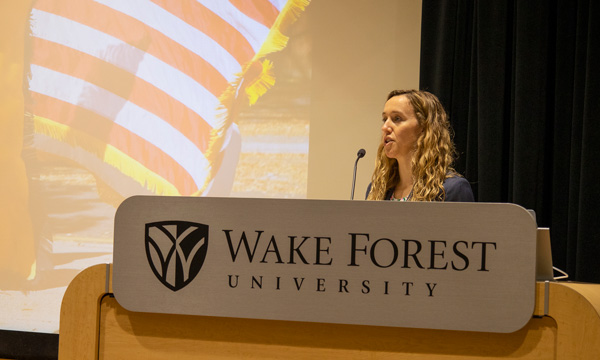Wake Forest University Honors Eleanor Morales (JD ’10), Director of the Veterans Legal Clinic, as a Decorated Deac

For Ellie Morales (JD ’10), it was her experiences during a Department of Defense internship while attending Davidson College on an Army ROTC and a swimming scholarship that solidified her desire to pursue a legal education.
“Seeing real-life military and government civilian lawyers impact national and international events persuaded me to become a lawyer,” she says. “I thought that being a military lawyer would be the best way I could make an impact in the service of others and my country.”
Her career spent doing just that and more led Wake Forest University to honor Morales as the “Decorated Deac” during the football game against N.C. State on Nov. 13. The recognition is among many she’s received for her service to her country and clients throughout her career — which has most recently brought her back to Wake Forest Law as the Director of the Veterans Legal Clinic to supervise students as they work with former service members to correct injustices in their military records.
“What I enjoy most about teaching at Wake Forest Law is the same reason I chose to come to Wake as a law student: the community, including the faculty, staff, and students,” says Morales. “It’s a supportive environment that fosters growth and learning.”
Immediately after graduating from law school, Morales joined the Army Judge Advocate General Corps, first serving as a legal assistance attorney and later as a military criminal prosecutor while stationed at Fort Hood in Texas. In 2013, she volunteered to deploy to Kabul, Afghanistan, as an operational law attorney, where she advised a senior-level commander on the rules of engagement and the law of armed conflict supporting the International Security Assistance Force and U.S. forces. The position offered her the opportunity to collaborate with not only service members from multiple military branches, but also military lawyers from around the world.
Returning to Fort Hood about a year later, she then went on to attend airborne school at Fort Benning in Georgia and became part of the 82nd Airborne Division stationed at Fort Bragg in North Carolina, where she advised a brigade commander on legal actions. Upon transitioning into the Army Reserves in 2015, where she currently serves as an Army judge advocate in the rank of Major, she worked as an Assistant U.S. Attorney for the Department of Justice for five years. In 2019, Morales and her colleague received the DOJ Director’s Award for Superior Performance for their work successfully prosecuting the first sex trafficking trial in the Eastern District of North Carolina.
She says her experiences as a law student in her criminal law and evidence courses, as well as in the Innocence and Justice Clinic, had an impact on her work after law school.
“They formed how I viewed justice and influenced me as a military and federal prosecutor,” she says.
But according to Morales, it’s the law school’s deeply personal and flexible approach that leaves a lasting impact on its alumni.
“Each law student has the flexibility to decide their own path,” she says. “Wake encourages and fosters diverse careers for its students, who graduate as well-rounded lawyers and possess strong legal writing skills. They’re lawyers who are hardworking and focused on serving others and their communities.”
The mission of Wake Forest Law is to advance the cause of justice by creating knowledge and educating students to meet the legal needs of the world with confidence, character, and creativity. We instill in students a respect for the law, a devotion to the ideal of service, and a commitment to professional values. We educate students from around the world in a richly diverse, equitable, and inclusive community. Learn more at law.wfu.edu, and stay up to date on what’s happening in the Wake Forest Law community by following us on Twitter, Instagram, and Facebook.
Categories: Our People